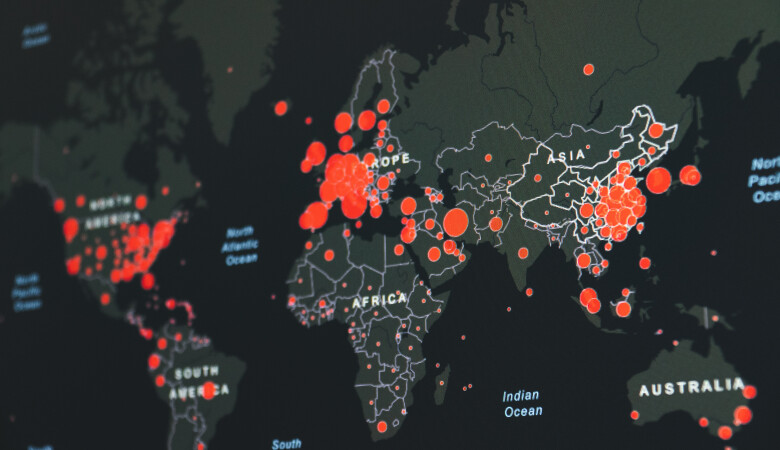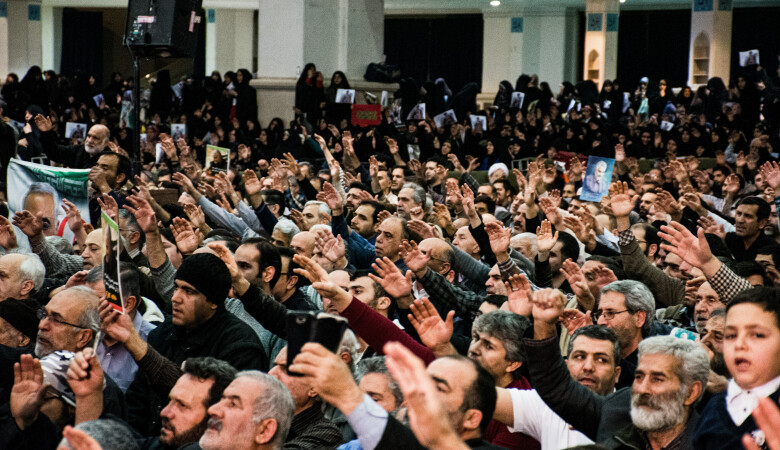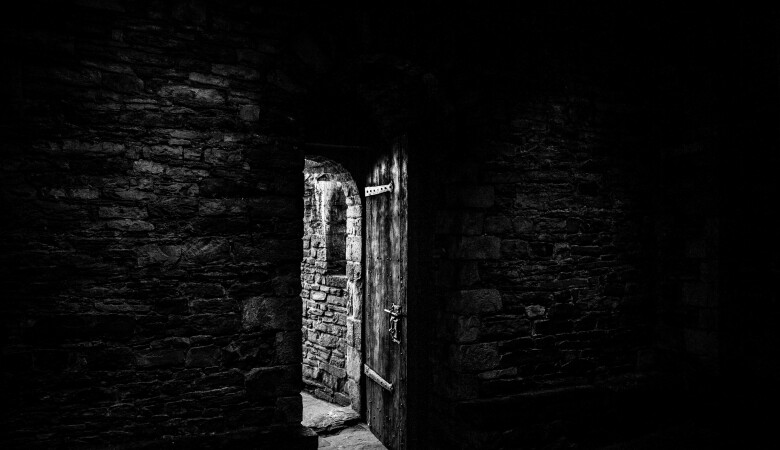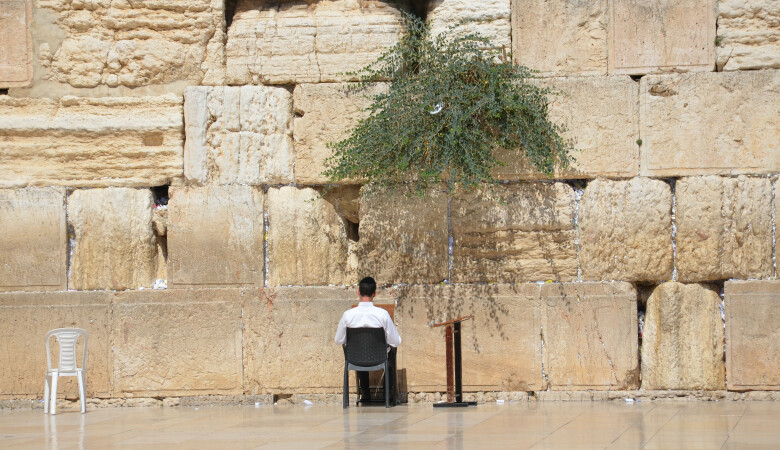Series: Mark
God the Father Interprets the Cross of Christ (Mark Sermon 86)
April 21, 2024 | Andy Davis
Mark 15:33-39
Atonement, Justice of God
See the signs of the cross: the hellish darkness, the torn curtain, the anguished cry, and the heartfelt confession, and believe in Jesus as the Son of God.
- SERMON TRANSCRIPT-
Almost two weeks ago, the staff went out and went onto the roof over here to look at the solar eclipse. Some of you may have done that day as well, it was about 3:15 in the afternoon. We had a similar eclipse back in August of 2017. I went out there and there were these special glasses, these NASA approved glasses that you were supposed to use when you looked at the sun. I hadn't had my turn yet, and I thought, "What can the harm be in taking a quick glance." I mean, we look at the sun all the time, don't we? The answer is no, we don't. We learned a long time ago not to do that. There's way too much brilliance that comes from the sun and it's blinding. So those special glasses that are designed to enable us to look directly at the sun without damaging our eyes. That whole thing is kind of a strange metaphor as we come this morning to the cross of Christ.
The glory of God is the radiant display of the attributes, the perfections of God. I've said for many years there's no greater display of the glory of God than the cross of Jesus Christ. But amazingly when we look at it, we don't see most of the light that comes from it. We have a different kind of blindness that's on us. We need a different kind of glasses to look at the cross— the glasses are faith. It is by faith that we can see invisible spiritual reality, and none of us sees all of the light that flows from the cross of Christ. None of us takes it all in. It's impossible.
But it's important for us to come again and again to this greatest display of the glory of God and understand it. The theme of today's sermon is how easy it is to misinterpret the cross, to misinterpret the events and the significance. Across the centuries people have done this. They have misunderstood and misinterpreted the cross of Christ. It was going on even while Jesus was dying. They didn't even hear His statement correctly. They thought He was calling Elijah, so they didn't even interpret that properly, waited to see if Elijah could come get Him.
Jesus' enemies utterly hated Him and despised Him. They didn't understand who He was. They considered Him a blasphemer and a deceiver of the people. So for them, Jesus hanging on a Roman cross was clear vindication of these views. He was condemned by the high priest who tore his clothes and says, "You've heard the blasphemy. What do you think? He's worthy of death because of his blasphemy.” Therefore, these religious leaders saw Jesus' death on the cross as a punishment directly from God for His blasphemies and His deceptions. The chief priests and the Pharisees, the teacher of the law mocked Him, saying, "He trusts in God. Let God rescue him now. If he wants him for he said I'm the son of God." For these religious leaders this shameful death on the cross was proof that Jesus was dying under the curse of God and obvious proof that He was not the Messiah and still less the son of God. Instead, God was killing Him for His blasphemies.
It's amazing that Isaiah centuries before that, and David, centuries even before Isaiah, had predicted this misunderstanding. In Isaiah 53:4, it says, "We considered him stricken by God, smitten by him and afflicted." Psalm 22:7 and 8, "All who see me mock me. They hurl insults, shaking their heads. 'He trusts in the Lord. Let the Lord rescue him. Let him deliver him if he delights in him.'" And when He didn't, it's proof that He didn't delight in Him.
The population of Jerusalem at that time also misinterpreted the cross of Christ. As they passed by in the road, they called out this exact mockery as well, "Come down from the cross if you are the son of God." The Roman soldiers, as we saw last time in the Praetorium, had taken part in this shameful mocking. They knew less about Jesus' life and ministry and doctrine. To them, He was just a rabble-rousing Jew accused of being king of the Jews. So they mocked Him, putting a scarlet robe on His shoulders, a crown of thorns on His head, a scepter of reed in His hand, and they scourged Him and beat Him and spat upon Him. Finally they led Him away to be crucified. How did they interpret the cross of Christ? Just another dead Jew, like thousands of others.
This has been going on across 2000 years of history. People have misinterpreted the cross of Christ. Thomas Jefferson went through all of the Gospels and culled out Jesus' moralistic teachings. He said it was as easy for him to do as finding diamonds in a dung heap. He thought that Jesus was a moral reformer who came to bring the Jews into a more enlightened morality, better than that of the old covenant. But they couldn't handle it. They weren't ready for it, and so they killed Him. In his abbreviated gospel, Jefferson cut out any reference to the atoning sacrifice, any reference to the resurrection or any of that at all. He was a moral teacher whose teachings were ahead of his time and He died for that reason.
The 12th century French theologian Peter Abelard came up with a moral influence theory saying Jesus died as a demonstration of love. That we're estranged from God. God doesn't want us to be estranged, so He kills His son to win us or woo us back to Him. But there was no substitutionary atonement in his theory.
Mahatma Gandhi said this, "I could accept Jesus as a martyr and embodiment of sacrifice and a divine teacher, but not as the most perfect man ever born. His death on the cross was a great example to the world. But that there was anything like a mysterious, miraculous virtue in it, my heart could not accept. The pious lives of Christians, including Christ, did not give me anything that the lives of men of other faiths had failed to give." To Gandhi the cross of Christ is just another example of heroism, no different than any other inspirational example.
To others the cross of Christ is worthy of scorn. So it was to the philosopher elites in Athens at Mars Hill when Paul preached the crucifixion and resurrection, they mocked and scoffed. Paul wrote in 1 Corinthians 1:18, "For the message of the cross is foolishness to those who are perishing." He also wrote, "We preach Christ crucified: a stumbling block to Jews and foolishness to Gentiles, but to those whom God has called, both Jews and Greeks, Christ the power of God and the wisdom of God."
All of these people were misinterpreting the cross of Christ even to this present day. But frankly so to did Jesus' closest followers. They grieved over the death of Christ. They mourned over it, and that grief continued after accounts of His resurrection had come. The two disciples on the road to Emmaus were depressed and downcast. Mary is weeping in front of the empty tomb looking directly at the evidence of His resurrection and weeping and mourning over it. None of them expected an atoning death and a bodily resurrection. It says in Luke 9:45, when Jesus warned them ahead of time what was going to happen, it says they did not understand. It was hidden from them so that they could not grasp it. They had the opposite of those dark glasses; they had blindness over their mind so they could not see the light of the glory of God in the cross of Christ.
In the end, only God the Father can properly interpret the cross for us. He's the only one that can tell us what it really means. This lines up with one of my favorite lines from William Cooper's hymn, “God Moves in a Mysterious Way.” The final stanza says this: "Blind unbelief is sure to err and scan his work in vain. God is his own interpreter and he will make it plain." That's especially true when it comes to the cross of Christ. God must interpret the cross to us. He must tell us what it means, and He began to do it that very day. He did it even more on the third day when He raised Christ from the dead, and even more after that when He inspired the apostles to write the epistles giving us the theology of the cross. But it began when Jesus was still on the cross. We're going to look at four elements of it from the account: the darkness, the cry, the curtain, and the confession. I want to seek to show how the Father was interpreting the cross through each of those elements.
I. The Darkness
First, the darkness. Look at verse 33, "At the sixth hour darkness came over the whole land until the ninth hour." This was a physical darkness, a literal physical, actual darkness that came over the land. God shut the daylight down for three hours from about noon until about three in the afternoon, usually the height of the sun's rays. There is evidence, historical evidence that this stunning celestial event was not merely local but extended over that entire region of the inhabited world. The text says darkness came over the whole land, and that could either mean just that immediate area, Palestine, or it could go further than that. The Christian apologist Tertullian writing in the 2nd century called it a cosmic or a world event, evidently visible in Rome, Athens and other Mediterranean cities and challenged his non-Christian adversaries to explain it. He wrote, "At the moment of Christ's death, the light departed from the sun and the land was darkened at noonday, which wonder is related in your own annals, and is preserved in your archives to this day."
The Greek writer Phlegon writing in 137 AD reported that in the fourth year of the 202nd Olympiad, that's around 32, 33 AD, there was the greatest eclipse of the sun so it became night in the sixth hour of the day so that the stars even appeared in the heavens. 2nd century chronicler Phlegon records that during the reign of Tiberius Caesar there was a complete solar eclipse at full moon from the sixth hour to the ninth hour. Eusebius of Caesarea, the historian in his chronicle quotes him, Phlegon, saying, "A great eclipse of the sun occurred at the six hour that excelled every other before it, turning the day into such darkness of night that the stars could be seen in the heaven and the earth moved in Bithynia, toppling many buildings in the city of Nicaea." He added a testimony of an earthquake. It's amazing.
How did God do this? We'll never know. Similar to the star that led the Magi to Bethlehem, it's a celestial event that we can't really explain. We know in the days of Joshua, He actually elongated the sunlight so that Joshua could finish his military work that day. God controls the cosmos. He can do this anytime he wants.
The physical darkness is also a symbol of the spiritual darkness that Jesus came to destroy. It seems reasonable that Almighty God, the ruler of the heavens and the earth, was communicating to the human race about this darkness. But what was He saying? In the Bible, light consistently represents goodness. It represents God. In 1 John 1:5, "God is light, and in Him there's no darkness at all.” God created the light and He called the light good, He didn't call the darkness good." Jesus Christ said, "I am the light of the world. Whoever follows me will never walk in darkness but will have the light of life."
Darkness then represents sin and death, whereas light represents truth and life. As Isaiah 9:2 says, "The people walking in darkness have seen a great light, on those living in the land of the shadow of death, a light has dawned.” Satan's kingdom is called the kingdom of darkness. "He has delivered us," Colossians 1:13, "from the dominion of darkness." And also Ephesians 6:12 says, "Our struggle is not against flesh and blood, but against the rulers, against the authorities, against the powers of this present darkness and against the spiritual force of evil in the heavenly realms."
When Jesus entered the world at His birth, an angel appeared and the glory of the Lord shown around him. That glory that was visible light represented the glory of God. But now that Jesus is dying, it seems the physical light was taken out of the world. The misinterpretations of the cross shows that people that day were walking in spiritual darkness. They could not understand what was really going on.
The future of darkness, if we look at where we're heading in history and also in our own personal lives and the lives of the world, the day of the Lord is coming. The day of the Lord is Judgment Day and it's presented in Amos 5:20 as a day of darkness, not of light. "Will not the day of the Lord be darkness, not light, pitch dark without a ray of brightness." So to some degree, it was the day of the Lord for Jesus when He was dying, it was Judgment Day on Him. So also the future day of the Lord in Isaiah 13 will be a day of darkness. It says, "behold," this is Isaiah 13:9-11, "Behold, the day of the Lord is coming, a cruel day, with wrath and fierce anger to make the land desolate and destroy the sinners within it. The stars of heaven and their constellations will not show their light. The rising sun will be darkened and the moon will not give its light. I will punish the world for its evil and the wicked for their sins."
But even worse is the darkness of hell itself. Hell, Jesus taught is a place of outer darkness. Matthew 25:30, "bind them, the condemned, hand and foot and throw them outside into the darkness where there'll be weeping and gnashing of teeth." If light represents everything good from God and the display of the glory of God and all that, there is none of that in hell. I believe that Jesus as He was drinking the cup of God's wrath, was experiencing the darkness of hell for us. The physical darkness that surrounded, the eerie supernatural darkness was a picture of the uniqueness of that moment. Conversely, for us who believe in Christ, the new heaven, new earth and the new Jerusalem will be constantly awash, radiantly illuminated with the glory of God.
II. The Cry
Secondly, the cry. Look at verse 34, "And at the ninth hour, Jesus cried out in a loud voice, 'Eloi, Eloi, lama sabachthani,' which means my God, my God, why have you forsaken me?" This cry of Jesus of total abandonment by God is infinitely mysterious. The doxology in Romans 11 says, "Oh, the depth of the riches of the wisdom and the knowledge of God, how unsearchable his judgments." What does that mean? You can't get to the bottom of it. It's bottomless. You don't have enough to plumb the depths of what God has done, and that's especially true when it comes to the cross. When it comes to this cry, we'll never fully understand it.
"This cry of Jesus of total abandonment by God is infinitely mysterious. The doxology in Romans 11 says, 'Oh, the depth of the riches of the wisdom and the knowledge of God, how unsearchable his judgments.'"
This cry is so deep and so significant that the Holy Spirit wanted the very sounds of it, the syllables of it, what it sounded like to be permanently rendered in the gospel accounts so that every translator of the Bible into every language all over the world would have to find some way with their phonology to communicate these syllables, "Eloi, Eloi, lama sabachthani."
I went and got my Japanese Bible, and sure enough, there it is in the Katakana syllables their attempt to get Eloi, Eloi, lama sabachthani into the Japanese language. Why? It's just incredibly significant moment. It's like a time capsule ,and an aroma comes out. It’s like you're there. Then immediately we’re told what it means. It's not enough just hear the sounds because we don't speak Aramaic. "My God, my God, why have you forsaken me?"
Here is the infinite mystery of God's activity on the cross. Here we're looking down into the abyss. Number of years ago I went with my daughter, Daphne, to the Grand Canyon and they have something called the Rim Walk. You can walk along the actual rim of the Grand Canyon and there's no fence, and they have occasional signs there warning you. Effectively, your blood's on your own head. But people just keep getting too close to the edge and looking down. And every year people fall down to their death. The height of the rim above the Colorado River is about 5,000 feet. Here we're supposed to get as close as we can and look down into that abyss and try to understand what Jesus was experiencing at that moment. Here we have the infinite mysteries of theology, of the Trinity and of the Incarnation.
So first, the Trinity. We believe as Christians that the Bible reveals that there is one God and only one God, but that this one God has eternally existed in three persons, the Father, the Son, and the Spirit. And that the Father is the one God and the Son is the one God, and the Spirit is the one God. But the Father is not the Son, and the Son is not the Spirit, and the Spirit is not the Father. We believe that's eternal. We believe the entire universe depends on that reality.
So Jesus on the cross did not cease to be God. It's impossible. The relationship between the Father and the Son within the Trinity was not altered in any sense because the entire universe, physical and spiritual depends on that relationship forever. The universe, both physical and spiritual, is constantly upheld by the power and the will of the Trinity. The Father's will, the Son, the word of God, the Spirit, the power. By this, the universe continues to exist. That didn't stop when Jesus was dying on the cross.
But then you've got the mystery of the incarnation, which is that Jesus is fully human and fully God. So by Jesus' cry from the cross, we peer into the invisible spiritual world to see what God the Father is doing to Him as the son of man, as a human. Jesus cries out as if from the pit of hell, total abandonment by God and total wrath poured out on Him by God. This is, I believe, the most dreadful part of hell. Absolute final, total abandonment, forsakenness by God. God is in no sense there to bless, only to curse. It's terrifying. In hell the damned can experience no pleasure, no joy, no friendship, no gifts, no happiness of any kind, a cold, empty terror of sheer loneliness and isolation.
Now, this was unique, this cry. Unlike anybody else that will ever experience the wrath of God in hell and the condemnation, Jesus uniquely can say these words, "My God, my God, why do this to me?” Everyone else in hell will know that they're there because of the justice of God. They deserve what they're getting, like the thief on the cross said, “I deserve it.” I don't know if they'll come to that true recognition. It may well be they'll forever think they're there as a miscarriage of justice. I don't know. But it's not like they have no idea.
"Unlike anybody else that will ever experience the wrath of God in hell and the condemnation, Jesus uniquely can say these words, "My God, my God, why do this to me?” Everyone else in hell will know that they're there because of the justice of God."
But Jesus was sinless. Not only was He sinless, He had a perfect, constant and intimate relationship with God. "The Father has not left me alone. He's always with me," He says. He said before raising Lazarus from the dead, "I thank you, Father that you heard me. I know that you always hear me.” Many others have gone through terrible things and felt intimately close to God as they walk through, as in Psalm 23. “Yea, though I walk through the valley of the shadow of death, I will fear no evil.” Why? Because you are with me." Jesus didn't feel that. Why? Because Jesus is unique. He's completely unique. He was sinless and yet completely sinful. How? By substitutionary atonement, by the mysterious transfer of guilt, by 2 Corinthians 5:21, "God made Him who had no sin to be sin for us so that in Him we might become the righteousness of God."
Isaiah 53:5-6 are the clearest verses in the entire Bible on the transfer of guilt and substitutionary atonement, clearer than anything even in the New Testament, Isaiah 53. "He was pierced for our transgressions. He was crushed for our iniquities. The punishment that brought us peace was upon Him and by His wounds, we are healed. We all like sheep have gone astray. Each of us has turned to his own way and the Lord has laid on Him the iniquity of us all.” You could read through that in the spirit of Galatians 2:20 and make it singular. "Christ loved me and gave himself for me." You can just say that's true of me. He was pierced for my transgressions. He was crushed for my iniquities. The punishment I deserved was upon Him. I should be crying. "Why have you forsaken me? It should have been me." If we don't understand this, we don't understand the cross.
Abelard's moral example is foolishness. It's insanity. If there is no transfer of guilt, if there's no required death penalty paid, if there's nothing actually achieved, just a moral example, it's a picture of insanity rather than love. Instead, the substitutionary atonement was essential to the salvation of sinners like you and me from all over the world. Without it, we go to hell. This is God the Father's activity at the cross.
Now a side note, and I think it's significant. In a very practical sense, as Jesus is crying this out, He's urging all people all over the world throughout all time to read Psalm 22 because He's quoting directly Psalm 22 in verse 1, "My God, my God, why have you forsaken me?" This is a clear prophecy of crucifixion written 1000 years before Jesus was born. In that prophecy, David lays out clearly how the Messiah would die for the sins of the world and that would be by crucifixion. In Psalm 22:16-18, "Dogs have surrounded me. A band of evil men has encircled me. They have pierced my hands and my feet. I can count all my bones. People staring gloat over me. They divide my garments among them and cast lots for my clothing." Those details phrase by phrase, line by line, were fulfilled as Jesus was dying. But by Him crying out the direct quote of Psalm 22 in verse 1, He's urging us to read it. The crowd, as was predicted in the Psalm and also in Isaiah, misinterpreted this, as I said. They didn't hear it properly, “Eloi, Eloi.” They heard like “Elijah's Elijah,” like “my God is Yahweh”. That's what “Elijah” means, so they thought He's calling for Elijah, and they wanted to see if Elijah could get Him.
They want to go get Him a drink. In verse 36, "One man filled a sponge with wine vinegar, put it on a stick and offered it to Jesus to drink. 'Now leave him alone. Let's see if Elijah comes and takes him down.’" The apostle John in his account tells us this drink being offered to Jesus was a direct fulfillment of a specific prophecy. John writes in John 19:28-29, "Later, knowing that all was now completed, and so that Scripture would be fulfilled, Jesus said, 'I am thirsty.' A jar of wine vinegar was there.” Stop for a moment, how in the world did that get there? Who put it there? We'll never know. Some woman, some man, some boy or girl— I don't know— thought, "Hey, I think I'll fill a jar of wine vinegar and put it here at Golgotha." But it was essential to this prophecy being fulfilled. What prophecy? Psalm 69:21, "They put gall in my food and gave me vinegar for my thirst."
And at that moment, having received the drink, all the prophecies were now fulfilled. Mark tells us in verse 37, "with a loud cry, Jesus breathed his last." Typical of Mark, he doesn't tell us what He said with the loud cry. He keeps it very simple. Luke and John, however do. Luke 23:46, "Jesus called out in a loud voice, 'Father, into your hands I commit my spirit.'" And then John said, "Jesus said, 'It is finished.' And with that, He gave up His spirit.”
Jesus is in absolute control of His death in the exact same way that He'd been in absolute control of His birth. He chose to enter the world in the fullness of time at the right time by the Virgin Mary. Then He chose to die in a way that no human could ever say, "No one takes my life from me, but I lay it down of myself. I have the authority to lay it down and I have the authority to take it back up again. This command I receive from my Father." He's the only one that can say that. When everything was fulfilled at just the right time, He died.
That death was essential for our salvation. Why? Because the wages of sin is death, and we deserve to die, and an actual death had to be paid for us. Without the shedding of blood, there is no forgiveness. Ephesians 1:7, "In Him we have redemption through His blood, the forgiveness of sins in accordance with the riches of God's grace.”
III. The Curtain
Next we have the curtain. Look at verse 38, "The curtain of the temple was torn in two from top to bottom." As I was reviewing the Gospel of Mark, memorizing it over a year and a half, a couple of years ago, something hit me, something I'd never noticed before, and that was that Mark just tells us about this event but doesn't explain its significance at all. I find that fascinating. Why do I find it fascinating? Because most scholars say that the Gospel of Mark was written for a Gentile, probably a Roman audience. Most of them reading this— imagine it's just floating around —all you have is the Gospel of Mark, you're reading this, you would've had no idea of the significance of that statement.
But the Holy Spirit had a limited role for Mark. He had to stay in his lane. He had to just tell us what happened. He was going to give to the author of the book of Hebrews, the job of explaining it fully. It got me to think about the function of each of the 66 books of the Bible, what they're written for. I've never stopped thinking about this. It's very fascinating. Why does the Holy Spirit want us to know this? It's a very important question.
So what is the significance of the tearing of the curtain? We're told in the Jewish temple there was a Holy Place where the priest went constantly to do their daily sacrifices, animal sacrifices. But then there was a Most Holy Place where only the high priest could go once a year with the blood of the Leviticus 16 sacrifice, the date of atonement sacrifice, and separating them was a curtain.
The old covenant was all about barriers of access. It's all about this far you may come but no farther. That's what the old covenant's about. It's about walls and barriers, and you may not come. It's the first thing that the angel of the Lord said to Moses at the burning bush, "Do not come any closer." At Mount Sinai, there was a fence put around the base of the mountain, forbidding the people from going up, blocking them from going up into the presence of God, lest they be killed. The tabernacle and then later the temple was all about walls telling you you're not allowed to come.
This curtain separating the Holy Place from the Most Holy Place was a substantial physical thing, very substantial. It was 60 feet long, 30 feet high. It was about four inches thick. It was composed of 72 squares sewn together. It was so heavy it required 300 priests to put in place.
Right at the moment, at the tearing of the curtain, Jesus said, "It is finished.” Right at that moment, the curtain in the Temple was torn in two from top to bottom. This is the Father interpreting the cross for us right at that moment. It's a direct cause and effect because Jesus has finished the atoning work on the cross. The curtain was torn from top to bottom, and the text is direct cause and effect.
How did Mark the Gospel writer know that the curtain in the temple was torn in two from top to bottom? One of two possible ways. Number one, God, the Holy Spirit told it to him directly and he wrote it. There are many verses, and that's the only way we would know is that the Spirit told him. That's fine. We also know that there was a process that Luke had of accumulating testimonies and doing some research and collating in writing. That's what Luke did. In Luke 1: 3-4 he says, “Since I myself have carefully investigated everything from the beginning, I too decided to write an orderly account for you, most excellent Theophilus, so that you may know the certainty of the things you have been taught.” Mark probably did similar things.
The only way that you would know that the curtain was torn was by coming the next day and seeing that it was torn. But you would not have known that it was torn from top to bottom. You had to be there. You had to see it. You had to see it happening, and the only ones that could do that would be the priests. We're told in Acts 6 that later a large number of priests came to faith in Christ. I think that's what happened. It's significant that it was torn in two from top to bottom because we think of God as up. Jesus looked up when He broke the bread and the fish, and there's this sense that God is up and the spirit descended from above. Jesus ascended up into heaven, so God's up there. God is the one that did it. He's the one that tore it. And frankly, He's the only one that had the right to do it.
It's very significant. If you saw somebody making a point and they picked up, let's say, a significant document like the Declaration of Independence or the Bill of Rights, and they did this to it, what are they saying? It's obsolete, it's gone. That's exactly what God was saying to the old covenant at that moment. The old covenant is obsolete. It's finished, and He's the only one that had the right to do it. Not only that, but as I said, the old covenant was about barriers of access. We're not allowed to get close to God, but God wants us close. Let me say that again, God loves you. He wants you close. He wants you intimate. He looks at sin amazingly as a temporary problem, and for us who will end up in heaven, that's what it will have been in the end, a temporary block between us and a holy God that Jesus dealt with that day.
The moment that that curtain was torn from top to bottom, God is saying, "Come in. Come close. You don't have to stay out there anymore." The author to Hebrews tells us, first of all, of the obsolescence of the old covenant [Hebrews 8:13], "by calling this covenant new, he's made the first one obsolete." What a strong word that is. What is obsolete and aging will soon disappear. Therefore, it's all about access to God. Hebrews 4:16, "Let us then approach the throne of grace with confidence, so that we may receive mercy and find grace to help us in our time of need." Again, Ephesians 3:12, "In Christ and through faith in him we may approach God with freedom and confidence."
Now that Jesus' blood has been shed, the curtain is torn and we are invited, I would say even commanded to come close. Hebrews 10:19-22, "Therefore, brothers, since we have confidence to enter the Most Holy Place by the blood of Jesus, by a new and living way opened for us through the curtain, that is, his body, and since we have a great priest over the house of God, let us draw near to God with a sincere heart and full assurance of faith, having our hearts sprinkled to cleanse us from a guilty conscience and having our bodies washed with pure water." That's God the Father's interpretation of the cross.
The entire purpose of Christ's incarnation and his atonement was to bring distant sinners like you and me close to God. It's also a picture of heaven itself in which the gates will stand open forever and nothing impure or unclean will ever enter that place, but only for those who have trusted in Christ. They'll come in there, and all the enemies will be gone. There'll be no danger. The new Jerusalem gates will stand open forever and we will have full and free access to God. It says in Revelation 22:3, "His servants will see His face and serve Him forever." That's the access that we have.
Tragically, at some point, what do you think happened to those two pieces of the curtain? Someone picked it up and sewed it back together or they made a new one, and animal sacrifice continued at the temple for another generation. That's terrible. It says of marriage, what God has joined together let man not separate. Well, let me tell you something, what God has torn apart, let man not sew back together. As Jesus said in Matthew 23 of the Scribes and Pharisees, the chief priests and all the enemies, “You shut the kingdom of heaven in men's faces. You yourselves don't enter and you won't let those enter who are trying to.” It's tragic. But Jesus, it says of Him in Revelation 3:7, "What he opens, no one can shut. And what he shuts, no one can open." Amen.
IV. The Confession
Finally, the confession. Look at verse 39, “And when the centurion, who stood there in front of Jesus, saw how he died, he said, ‘Surely this man was the Son of God!’” Amen. I consider this to be kind of the omega, the alpha and the omega of the Gospel of Mark, the purpose of the whole thing. Why did Mark write the Gospel? He says right at the start, Mark 1:1, "The beginning of the gospel about Jesus Christ, the son of God." And now here at the end, what does this onlooking centurion say? "But truly, this man was this son of God.” I believe all four Gospels, as I've said this countless times, had the same purpose. John 20:31 tells us, "These things are written that you may believe that Jesus is the Christ, the son of God, and that by believing that you may have life in his name."
I believe that this centurion's confession was a display of genuine saving faith on his part. He was speaking for his team, or at least some of his team at that moment. Why do I say that? Because Jesus prayed for them while He was dying on the cross. Remember? In Luke 23:34, He said, "Father, forgive them for they don't know what they're doing.” I have a very high view of Jesus' prayer life. I believe everything Jesus asked for, He gets. Amen. Did He get this? Did they get forgiveness? Forgiven for that, but not for anything else. That's worthless. What good is partial forgiveness by God? You still go to hell. He's praying for complete forgiveness for a group of people who crucified Him not knowing what they were doing. And who was that? The centurion and his team that was there to crucify Jesus. Why do I say team? It was just the centurion that said, "Truly this man was the son of God." But Jesus said, "Father, forgive them. They don't know what they are doing.” I believe no one can make this confession, "Truly, this man was the son of God," unless the spirit of God works it in him and the Father reveals the son to that sinner. No one can come to me unless the Father who sent me, draws him. Just like the thief on the cross, so also this centurion, I expect to see him in heaven.
Imagine being the one who killed Jesus, who actually literally drove the nails through Him up in heaven worshiping forever. But isn't that just like God? Isn't that just like the mercy and the love of God?
V. Applications
Spurgeon, when he was preaching on this passage, sums it up saying, "What manner of people ought we to be if these things are true? What kind of love should we show to Jesus if these things are true?"
Just look at the four things, the darkness. God is interpreting the cross by saying that Jesus is truly the only answer to the darkness of sin and death in hell. Jesus is the light of the world. Follow him. The cry, "My God, my God, why have you forsaken me?" Understand that is a cry, which if you believe in Jesus, you'll never make from hell, never. You will never make. As a matter of fact, you'll be able to say what the author of Hebrew says concerning his relationship with you, "Never will I leave you. Never will I forsake you." Why? Because Jesus was forsaken in your place. So if you're feeling forsaken, you're feeling abandoned, just know if you're a Christian, that's impossible. God is with you. And then you can take Psalm 23 and says, "Though I walk through the valley of the shadow of death, I will not fear for you are with me."
What about the curtain? Hebrews tells you what to do. Draw near to God, draw near to him. Don't stay distant. If you feel guilty today because of some pattern of sin, read Hebrews 10:19-22. Let your faith in Christ cleanse you from a guilty conscience and let your body be washed with the pure water of the word. Repent of the sins that are making you feel guilty and draw near to God. Don't let the sin keep you far away, but draw near.
Finally, by the confession of the centurion, understand what the purpose of all of this is. It's missions. It's evangelism. It's winning lost people so they can make this same confession. Close with me in prayer.
Father, we thank you for the time we've had to study today. We thank you for the incredible truths of the cross of Christ. We'll never be able to plumb the depths. And I pray that you would take these truths and press them sweetly and powerfully into our hearts so that we may believe that we may draw near, that we may live holy lives, that we may see other people make this confession, "Truly, this man was the son of God." Pray this in Jesus' name. Amen.































